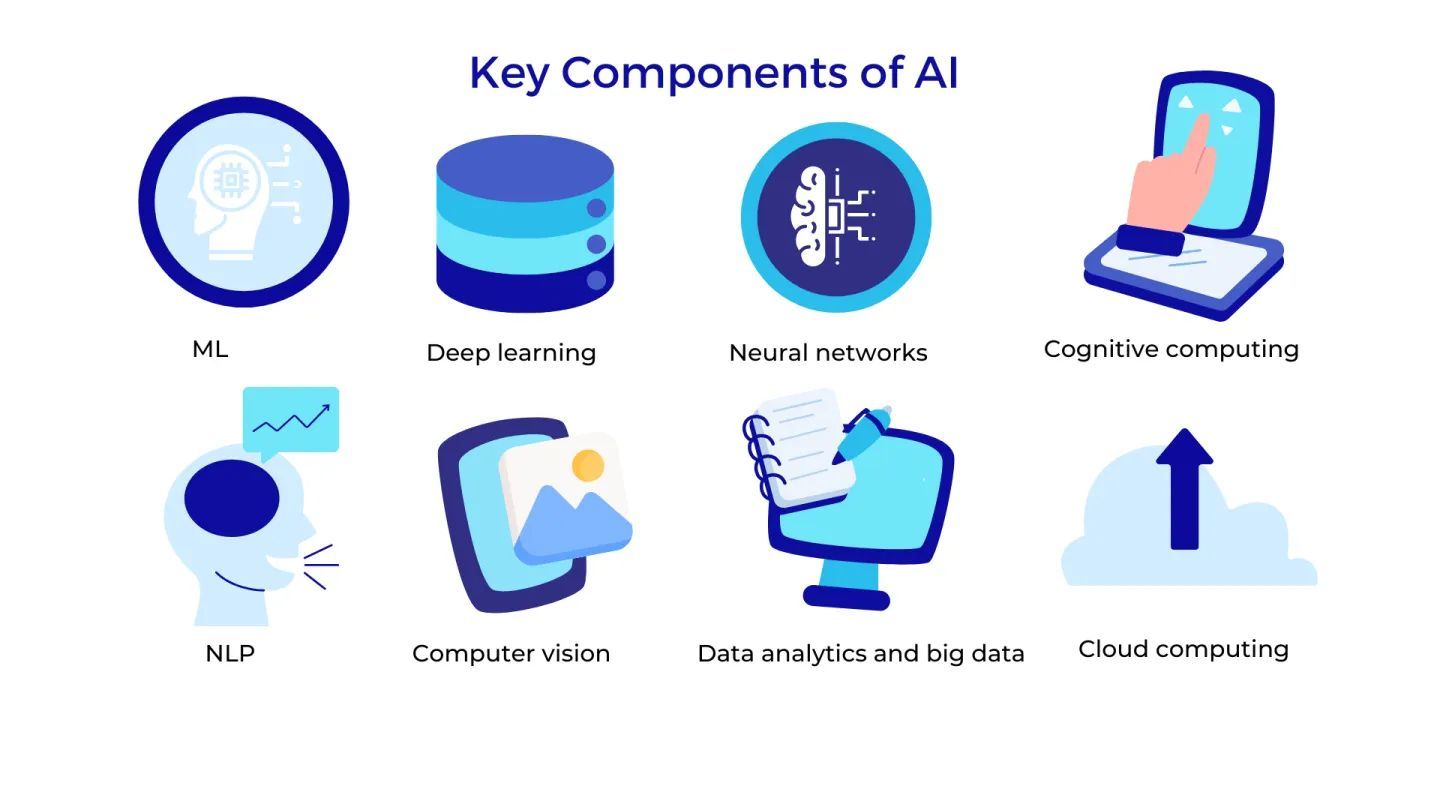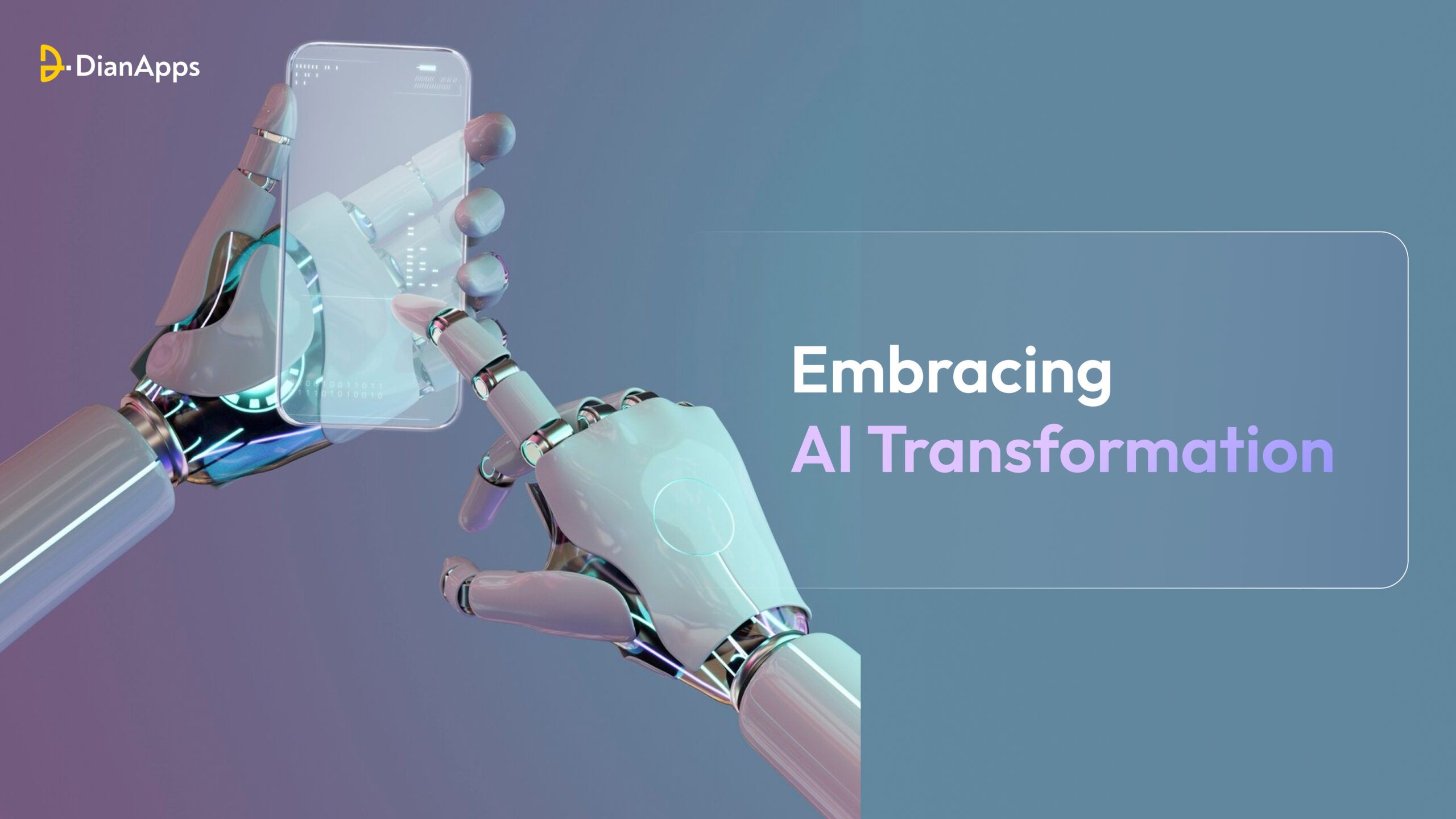Integrating AI is becoming a must for businesses intending to stay ahead, ideate, and find new growth opportunities. However, starting an AI transformation can be stressing, especially if you’re new to AI. Where do you begin?
We’ve created a comprehensive AI transformation guide to answer all your questions. It covers what AI transformation is, and its key components, and walks you through the steps of digital transformation while highlighting the latest trends for the coming year.
Understanding AI Transformation
AI transformation is the next step in digital evolution, integrating AI solutions across all business areas to enhance value and streamline operations. Data shows that AI is becoming essential in both commercial and operational aspects. For instance, a Survey found that 79% of corporate strategists see AI, data analytics, and automation as crucial for success. PWC predicts significant business impacts from AI, with tools like automated emails and chatbots already widely used.
By 2025, almost every retail executive expects to adopt AI automation, while the global machine-learning market is projected to grow rapidly, reaching $225 Bn by 2030. As AI becomes more popular in various industries, from healthcare to logistics, businesses must adopt the right strategies to stay competitive and innovative.
Key Drivers of AI Transformation

1. Natural language processing
NLP helps computers understand and work with human language in text or speech. It can be used to improve search results, analyze what people are saying on social media, translate content between languages, summarize information, or pull out key details from large amounts of data.
2. Computer Vision
Computer vision allows systems to understand and extract useful information from images or videos using algorithms. It’s used for things like recognizing objects in images, searching based on images, and detecting items. For example, it can identify machines that need maintenance or automatically tag photos with relevant details.
3. OCR and Digitalization
Optical character recognition reads printed or handwritten text and turns it into digital format. It’s commonly used to make large document collections easier to edit, store, and search. The data converted by OCR can also be used to help train and improve AI models.
4. IoT Integrations
IoT integrations include geolocation, which pinpoints the exact location of a connected device using its coordinates. This technology enables personalized customer interactions, like location-based pricing or targeted ads. It also helps in operations by using AI to plan routes or optimize supply chains, tracking assets and goods equipped with sensors connected to the IoT.
5. Automation
Automation allows machines to handle mundane tasks with less or no human involvement. AI assisted automation, or smart automation, can be used in many areas of business, such as managing IT operations and handling complex business processes.
6. Expert Systems and Decision Sports
A decision support system helps people solve unclear or complex problems, while an expert system tackles specific and often challenging issues. Both systems give organizations quick, data-driven insights from large datasets that would be too much for one person to analyze on their own.
7. Generative AI
Generative AI is a type of AI that creates first-hand content like text, images, videos, audio, or code based on user requirements. It uses deep learning models that copy how the human brain works. In consumer apps, generative AI can instantly create personalized content. In business, it’s used for tasks like helping employees with AI assistants, generating code, and developing and testing products. It’s also increasingly used for training, incorporating gamification into team learning. For example, AI roleplay tools designed for customer-facing teams allow employees to practice real-world conversations in a structured, hands-on way.
8. Big Data Analytics
Big data analytics involves analyzing huge sets of data using advanced methods like machine learning and data mining to find worthwhile insights. This data is often used to train AI models and is usually processed in a data lakehouse, where it’s gathered, cleaned, and analyzed.
The Power of Innovation Through AI
Business owners often wonder if investing in AI will be worth it. From our experience, adding AI to digital transformation efforts offers many benefits. AI tools can:
- Reduce mental workload
- Enhance system tracking and monitoring
- Allow for better testing and quality assurance through simulations
- Offer insights based on data
- Optimize business operations
- Improve customer experiences
- Automate tasks
- Support better decision-making
These advantages can give businesses a competitive edge and provide various internal and external benefits.
Here’s Why Businesses Should Invest in AI Transformation:
Boosted Operational Efficiency
AI helps automate repetitive tasks, making processes faster and liberating human workers to focus on more complex tasks. AI-powered tools like Automation Anywhere, Pega, and Tungsten Automation can connect with your existing systems, making the transition to AI smoother.
AI also analyzes your current workflows to find hidden patterns, identify issues, and suggest better ways to work. It can adjust processes, schedules, and resource use based on demand and availability.
Savings and Better Resource Use
Improving operations with AI can lower business costs and help use resources more effectively. Machine learning tools for forecasting demand and tracking performance provide valuable data for better resource and effort planning.
AI investments also save money by reducing labor costs. For example, natural language processing technologies automate the conversion of paper documents into digital formats, cutting down on manual work. This lets business owners either save money or reallocate it to strategic projects like research, development, or new technology instead of ongoing operational tasks.
Reduced Risks
For a business to succeed, it needs a plan that addresses both risks and opportunities. AI tools can help by analyzing and predicting market trends, giving you a heads-up about potential challenges and advantages.
AI can also help with risk management by predicting when your systems—whether software, hardware, machinery, or vehicles might need maintenance. These tools monitor performance, detect unusual patterns, and alert you before a major issue occurs. This helps keep your systems running smoothly and ensures your business stays operational with minimal disruptions and costs.
Personalized Customer Experiences
Many businesses focus on customer-centered approaches, but AI provides a deeper understanding of customers. By analyzing extensive customer data, AI marketing and sales tools identify patterns and trends. This helps businesses customize their products, marketing, and customer experiences to better match individual preferences. AI chatbots, self-service tools, and virtual assistants are already helping companies generate more leads, personalize sales communication, and handle customer questions more efficiently.
Smarter Decision Making
AI transformation greatly enhances data-driven decision-making through advanced analytics. AI tools quickly and accurately analyze large amounts of data, spotting trends, patterns, and issues, and providing projections. Machine learning boosts this by automating data analysis, creating detailed insights, and continuously improving the process. This helps company leaders see their market position, discover new opportunities and risks, identify internal problems, and make informed strategic decisions.
Edge Over Competitors
Companies invest in AI to stand out among their competitors. AI can improve your processes, products, and services, helping you keep up in the market.
- Marketing and Sales: AI helps understand customers better and create more personalized experiences.
- Product Development: AI allows for more innovation and testing of new features.
- Operations and Supply Chain: AI optimizes processes, resources, and inventory using data and automation.
- Customer Service: AI enhances service with tools like chatbots and voice assistants, making support more efficient and satisfying.
Real-Life Examples of Companies that Integrated AI in Innovation
1. Apple
Siri, Apple’s voice assistant, starting with the iPhone 4S available since a decade. Apple calls it the “most private digital assistant.” Siri uses AI to help with tasks like setting timers, reminders, making calls, and doing online searches.
2. Grammarly
Grammarly uses AI to help with writing by offering context-aware suggestions. Its business solution also uses organizational knowledge to boost team productivity and reduce costs. Grammarly provides premium, free, and educational tools for writing support across more than 500,000 apps and websites.
3. Cruise
Cruise is the first company to provide robotaxi services in a major city, using AI to drive cars. Their self-driving vehicles gather a huge amount of data daily. AI uses this data to continuously improve safety, driving methods, and route efficiency, ensuring riders are safe.
Challenges Businesses may face in AI Transformation
1. Quantifying the ROI in AI
Measuring ROI for AI can be challenging due to the complex costs and benefits involved. To manage this, start by developing a low-cost minimum viable product to test the value of AI before investing heavily. Scale up based on successful results. Also, set clear key performance indicators aligned with your business goals to better track progress and assess ROI, helping guide your investment decisions.
2. Choosing the Right Models
Choosing the suitable AI model can be tough because there are many options with different pros and cons. To make the best choice, first, clearly define your business needs and the features you require. Experiment with different models on a small scale to see which one performs best in real world scenarios. Consulting AI experts can also help you understand your options and find the model that best fits your needs.
3. Complex Algorithms and Training Models
AI algorithms are crucial for business intelligence, and understanding how they work can greatly impact your outcomes. While setting up and continuously training AI models may require significant effort and manpower, the advantages of using AI in your business are worth it. With the right approach, the benefits of improved performance and insights from AI can outweigh the challenges of implementation and ongoing management.
4. Determining the right data set
AI systems need quality data to function well, so choosing the right data set is crucial. It can be challenging to decide which data to use since organizations handle various types. To improve AI’s decision-making and learning, businesses should identify and use the best data. Consulting experts of AI/ML Development Services can help guide you in selecting the right data and achieving effective, transformative results.
5. AI Integration into Current Systems
Many businesses find it challenging to integrate AI into their existing systems. This is a common issue when implementing AI. To successfully integrate AI, companies need to work with experienced AI solution providers who can guide them from the initial planning stages to full deployment. Their expertise helps ensure a smooth and effective integration of AI into current business operations.
6. Data Security and Storage
AI applications use a lot of data, which can lead to storage and security challenges. To manage this, businesses need a strong data management system that ensures data security and makes it easier to access data for AI and machine learning projects. Proper data management helps protect sensitive information and supports the effective use of data in AI applications.
Since you are at it, you may also like to read about the Best AI Development Firms In 2024!
Conclusion
As you begin your AI transformation, remember that success isn’t about using the most advanced AI algorithms but about how much value they bring to your business and customers. Focus on solving actual problems, bringing innovation, and achieving clear business results.
To do this, selecting the right AI integration strategy is essential. Working with experts from a custom software development company like DianApps, which has substantial AI expertise, can help you unlock the full potential of artificial intelligence.










Leave a Comment
Your email address will not be published. Required fields are marked *